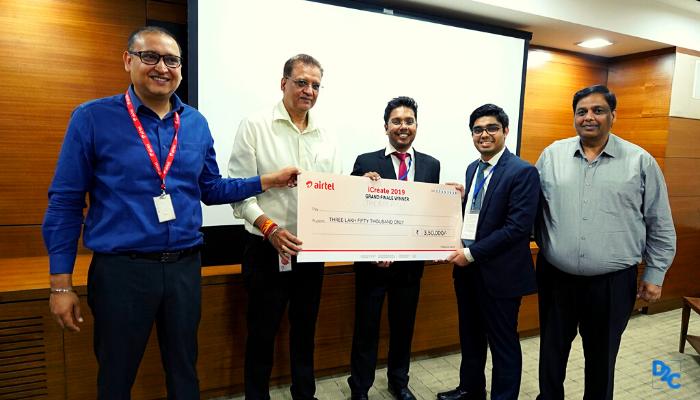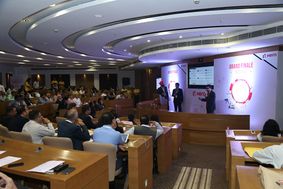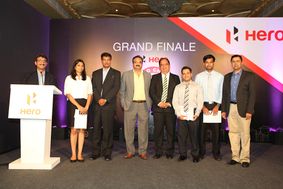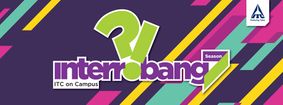Team The Red Pill from XLRI teach you how to become the national winners of Airtel iCreate 2019

Airtel iCreate was significantly more challenging than any other case competitions in the sense that you're not just competing against the teams participating in the same domain (say, Finance) but also against teams from other domains (Marketing, HR, Supply Chain). So, one had to make an informed choice of selecting the appropriate case study right at the registration stage itself!
A strategy to combat the challenges
Our broad strategy was to focus on practical, feasible and economically viable solutions to the case problems, linked together through a storyline. Understanding the context of the case by undertaking exhaustive secondary research through various consulting firm reports and related news articles allowed us to unravel the industry's current situation and gave us the direction in which we could think of new & innovative solutions. At any stage, we never lost sight of the firm's existing capabilities and financial feasibility of the alternatives.
However, the competition was very challenging right from Round 1 wherein only 12 teams could make it to the next round i.e. finals out of 4000+ teams. Round-1 submission required an executive summary and presentation of the case solution, while Round-2 (the Grand Finale) submission was to be far more comprehensive in this journey.
Our biggest challenge hands down was to gather the data required to kickstart the case-solving process. Indeed the amount of data we processed directly impacted our solution. Another challenge that we faced before Round 1 was to coordinate while working remotely from our respective home locations. One of us is based out of a Tier 3 city with poor internet connectivity. Hence, any communication or research work called for a significantly high amount of time and patience. Apart from that, we faced various other challenges in terms of scalability and economic feasibility estimation of our solutions, for which we had to reach out to various stakeholders.
Everything about Airtel iCreate
The jury for the competition consisted of senior leadership of the organization, which included Mr. Ajai Puri (COO – Airtel India & South East Asia), Mr. Ajay Gupta (Senior VP, Commercial Business, Airtel India) & Mr. Sagar Raina (VP, Talent Acquisition, Airtel India). Their insights were impeccable and improvement suggestions to-the-point and precise.
In the finals of Airtel iCreate, there were 3 teams from each of the 4 domains (Marketing, Finance, Supply Chain, and HR), making it a total of 12 teams. Since we knew, firsthand, the kind of effort, hard work and grit it took us to reach the finals, we knew how dedicated the other teams were to win the competition. Therefore, the competition was tough among all the finalist teams.
During the grand finale, the teams were judged on the following parameters:
- Business & situation analysis
- The novelty of ideas/out-of-the-box thinking
- Ease of implementation of idea/solution
- Supporting analytics
- Financial viability/ROI
- Quality of presentation
Airtel mentors were allotted to each of the finalist teams. Our mentor gave us some very valuable and constructive insights which enabled us to refine our submission significantly before the final presentation.
The valuable learning experience
There was immense learning through the case competition. It gave us the opportunity to bring our textbook learning out of classrooms and implement it on a real-life business problem.
The extensive research gave us a tremendous understanding of the Indian telecom industry and gave us insights on where it is headed. Our excel skills were put to test with the financial modeling and we understood the nuances of making 'suitable' assumptions during that. We learned to look at a problem from multiple perspectives and understood how it is important for companies to avoid charging customers for every additional service rolled out unless absolutely necessary.
Lastly, we learned the expectations from a B-School graduate in the corporates and how any idea proposed, however novel and innovative, should be tested for its practicality, scalability and financial viability.
The two-member team
Our team had two members and our skills complemented each other. This proved to be advantageous during the case study challenge. One of our internship experiences in the mobile handset industry helped in thinking of new ideas. Moreover, due to the fact that we both had worked on multiple case studies and live projects in the past, data analytics and execution was another one of our strengths.
Being a two-member team, there was not much scope of having conflicts. Whenever we had disagreements, we followed a 2-pronged approach. First, we would put forward our point and the rationale each, and then play Devil's advocate for each other's ideas. This would allow us to refine each of the thought processes until one of them emerges victorious.
A memorable moment
There was a proud moment when the jury of Airtel iCreate praised our in-depth work and the width of the ideas presented. This happened towards the end of the Q&A. Since my team had exceeded the allocated time per presentation, the host was rushing our presentation as well as our Q&A. At this time, one of the jury members interjected and praised our presentation to be very detailed and comprehensive, and requested for additional time specifically for our team.
Login to continue reading
And access exclusive content, personalized recommendations, and career-boosting opportunities.














Comments
Add comment